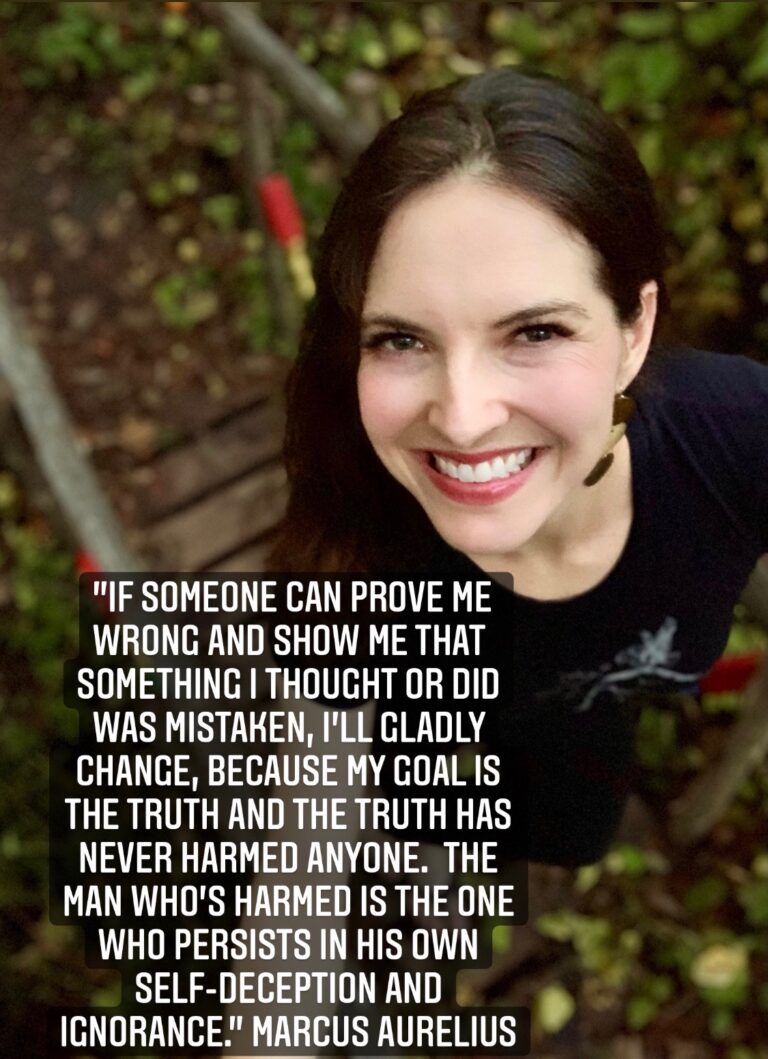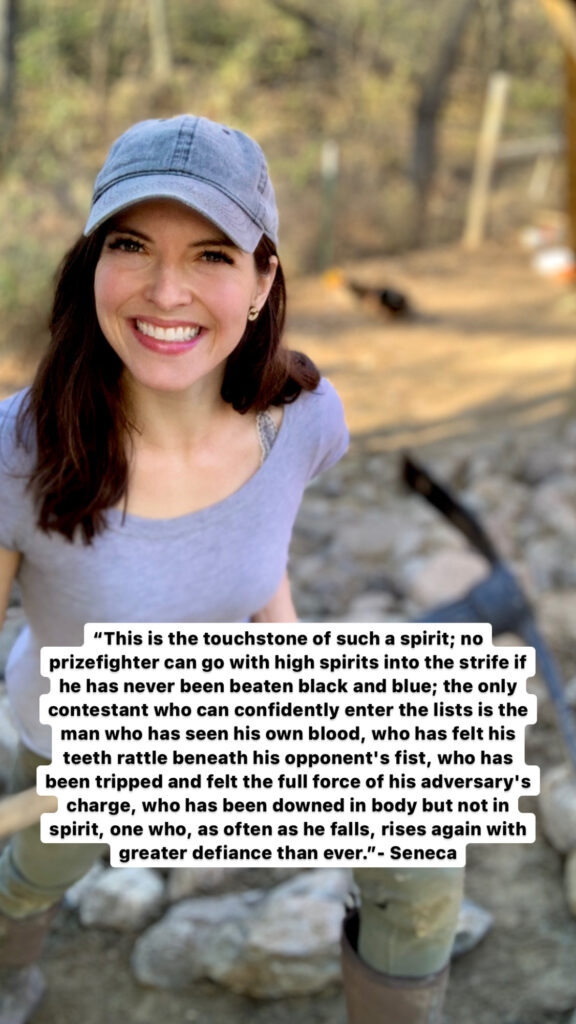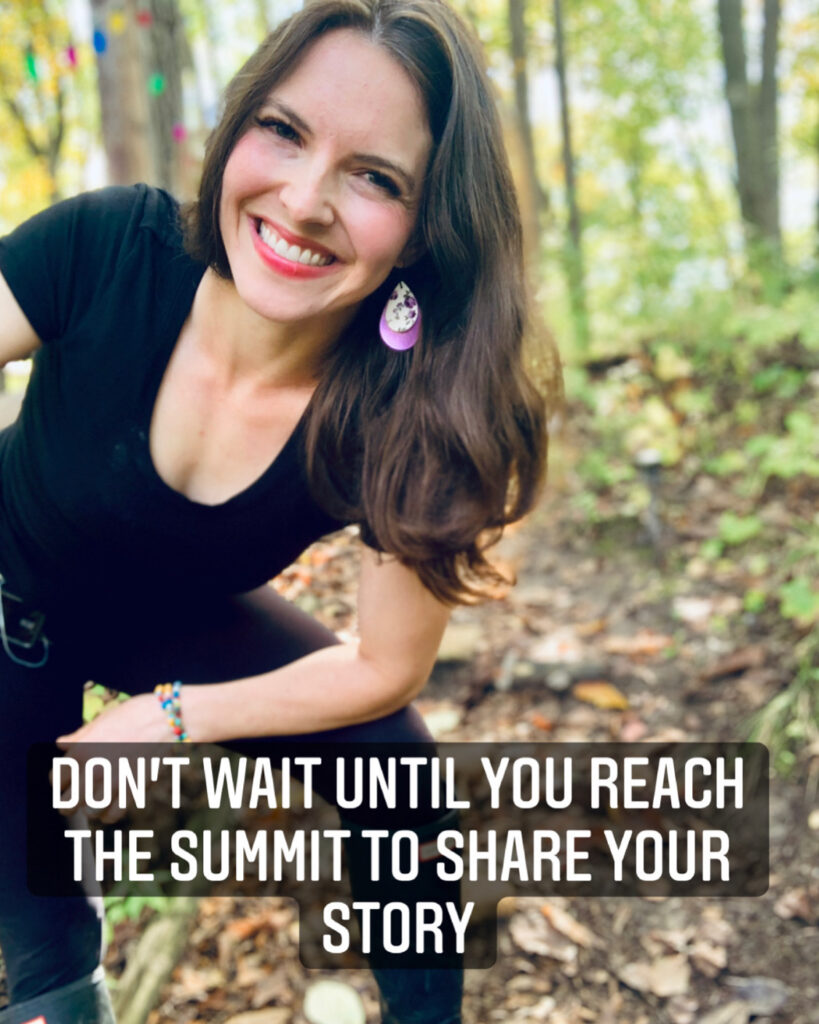What to expect from my talks?
- Humor-I bring my sense of humor to all that I do, there will always be laughter when I'm on stage, even if it's just my own.
- Stoic Wisdom- as one of the few women who speak on Stoic Philosophy, I love challenging the misconceptions and introducing the philosophy to new audiences.
- Candor- I don't hide behind a polished script, but instead engaged with the audience, connecting through vulnerability and confidence while discussing tough but important topics such as mental health, toxic envorinments, failure, and more.
- Storytelling - I weave storytelling into all of my talks as I believe it is the best way to teach and connect.
Mindfulness, leadership, vulnerability, authenticity, accountability, kale...buzzwords that are thrown together because they sound good and check boxes. What is missing is how to put them into action, to make lasting change that matters, and kale not taste like earth's armpit hair. That's where I come in, putting those words to work.
Available for onsite or virtual talks for *Organizations*Conferences*Health Care*Universities*First Responders*Corporations*Sports Teams
Bite Size Mindfulness
The Leadership Reflex: How to discover the Opportunities within Obstacles.

Key Topics
- Leading with integrity.
- Emotional Intelligence in Leadership
- How to build trust and confidence
- How to turn Obstacles into Opportunities
What is Mindful Leadership?
Mindful Leadership is being aware of the moment while never losing perspective of the bigger picture. These leaders train their reflexes to allow for reflection, turning obstacles into opportunities and understanding what is in their control and what is not, to lead from a place of inspiration not intimidation.
"Leadership is a lifestyle, not a job title."
This talk is perfect for organizations, businesses, teams and conferences that understand the value of leaderships in all aspects of life.
I have created my own philosophy and approach to teaching leadership by blending ancient Stoic wisdom with modern mindfulness and science. And while that may sound about as exciting and thrilling as a tax audit, I promise that I bring not only humor, but stories and true passion that will not only motivate change but create lasting change.
What is my approach to leadership? It is broken down into two parts- Reflex and Reflection.
When faced with an obstacle, having the right reflex is essential. The wrong, but all too common reflex, is the ‘knee jerk’. Where a leader tries to get as far aways as possible from the obstacle, often over reacting and causing more problems.
The correct reflex is the “car arm” that most of us have to protect whatever/whoever is in the passenger seat when faced with a sudden stop or sharp turn. When faced with that obstacle, a leader moves towards it and puts themselves between it and those they are leading.
This reflex requires curiosity, confidence and compassion. It is what allows for reflection, providing space for the essential pause required for a response vs reaction.
Great leaders can find opportunity within obstacles by building the reflex that allows them to stay agile while never losing perspective of the ‘why’, the bigger picture.
I introduce easy to remember, actionable approaches to things such as emotional triggers and perceived obstacles, to work on building that reflex.
For longer talks and in workshops we also dig into the reflective aspect of leadership.
Deceptive Reflection is the quickest way to erode trust. It is when a leader appears to be listening, to care, to ‘get it’, but then does nothing to solve the problem. Active Reflection requires vulnerable accountability, which can look like, “I don’t know how to fix this problem, but this is what I am going to do to figure it out, this is when you will hear back from me…”.
Know Thyself:Emotional Intelligence, the bridge to success.

This Talk uses my emotional intelligence ARC frame work to:
- Understand, regulate and leverage your emotions to your benefit.
- Recognize and navigate the emotions of others, putting empathy into action.
- Communicate, have difficult conversations from a place of reason not passion.
- Discover why emotional intelligence is the key ingredient to success and leadership
- Understand the importance of EQ in creating and maintaining relationships and connection that last, through vulnerability and accountability.
Over 2,500 years ago, the following maxim was engraved in stone above the temple of Apollo: “Know Thyself”.
Just two words, but incredibly powerful ones that when put into action, can lead to success in all walks of life. Understanding when we feel emotions, how we feel them and how we regulate them is crucial in leadership and life.
Emotional Intelligence (EQ) is a greater predictor of success than IQ, yet it is rarely leveraged or valued in the workplace. Unlike IQ, you can improve and grow your EQ, and those who do reap the rewards.
Emotional Intelligence is an essential skill when it comes to having difficult conversations, providing feedback, navigating chaotic and stressful situations, maintaining relationships, communicating and leadership.
Improving your EQ will help you turn obstacles into opportunities, creatively solve problems and lead with confidence.
Vulnerability, empathy and accountability, get put into action by those skilled in emotional intelligence- building trust and making you an invaluable leader and member of the team.
The Champion Mindset - be invaluable not most valuable.
True champions cheer for greatness, they respect, value and seek it out to recognize and celebrate.
Champions are able to recognize the difference between ego and confidence. They know when to quit, when to push forward and when to pause. They understand that a leader is also a follower.
A champion’s path to success doesn’t depend on the failure of others. They know what is in their control and what isn’t.
Stepping on another’s back, and exploiting their weakness, may be the quickest way to the top, but it is also the fastest way to fall. Champions set their own summits, their own goals, and reach them by helping others reach their own.
Confident people get excited, not afraid, when they see others succeed. They see opportunities in obstacles and greet failure with compassion.
Organizations that cultivate a champion mindset rise above those that remain victims of outdated stories of what success truly looks like, how to obtain it and how to maintain it.
They understand the duty they have to each other and to their community.
Some of the greatest leaders in sports and life are not those on the podium, but those who do their best and then cheer for those who do better.
Become invaluable, be a champion.

Key Topics
- How to become invaluable, not most valuable
- The O.A.R framework for creating a team of champions
- Confidence vs Ego in dealing with failure.
- Emotional Intelligence
Creating Change with Kindness: Purpose Driven Connection
Besides being a catchy headline, “The Great Resignation” points to a problem that is worthy of the time and attention of business leaders and owners around the country as burnout, frustration and dissatisfaction cause record numbers of employees to say “enough!”.
Making people feel seen, valued and wanted doesn’t need to be complicated but it needs to happen. I have taken the most common pitfalls and obstacles to creating a healthy organizational environment- including bullying, toxic employees, fear of failure- and paired them with solutions that are simple, and sustainable.
Mental health matters now more than ever, but many struggle with understanding how to talk about it, put mindfulness into action and navigate emotions in the workplace. This talk covers all of that and more, leaving everyone feeling empowered to do their part in making a positive impact on those around them.
Key Topics
- How to give feedback and have difficult conversations
- How to replace ego and anger with confidence and grace.
- Understanding the impact of the 'Curse of Knowledge' on communication.
- Emotional Intelligence

Key Topics
- How to use productive storytelling to turn obstacles into opportunities to build trust and create connection.
- Identify the destructive stories we tell ourselves and how to turn them into productive stories.
- Emotional Intelligence
The Power Of Storytelling
Storytelling is often viewed as a soft skill, when it is a survival skill. We have stories to thank for our existence today- from which berries to eat to how to build trust and alliances. Stories have ignited wars and inspired peace. They have built empires and destroyed dynasties.If, not when, you are charged with a serious crime and have a trial in front of a jury- studies confirm that you want a lawyer who is good at storytelling.
Storytelling is the quickest way to build genuine connection and the applications are endless from health care to sales to leadership, yet it is rarely taught or valued. These are productive stories. They demonstrate confidence, accountability and vulnerability and open the door for connection.
The stories we share are productive, but the stories we tell ourselves are destructive. These are the stories we tell ourselves daily that hinder our ability to connect both in business and in our personal lives. The stories we tell ourselves are rarely based in fact but instead in judgment and fear. The stories we tell ourselves in response to the actions/words of others rarely match up- they make small things big.
Identifying these stories and learning how to turn them into productive stories can be one of the most impactful changes you will make both in life and in business.





